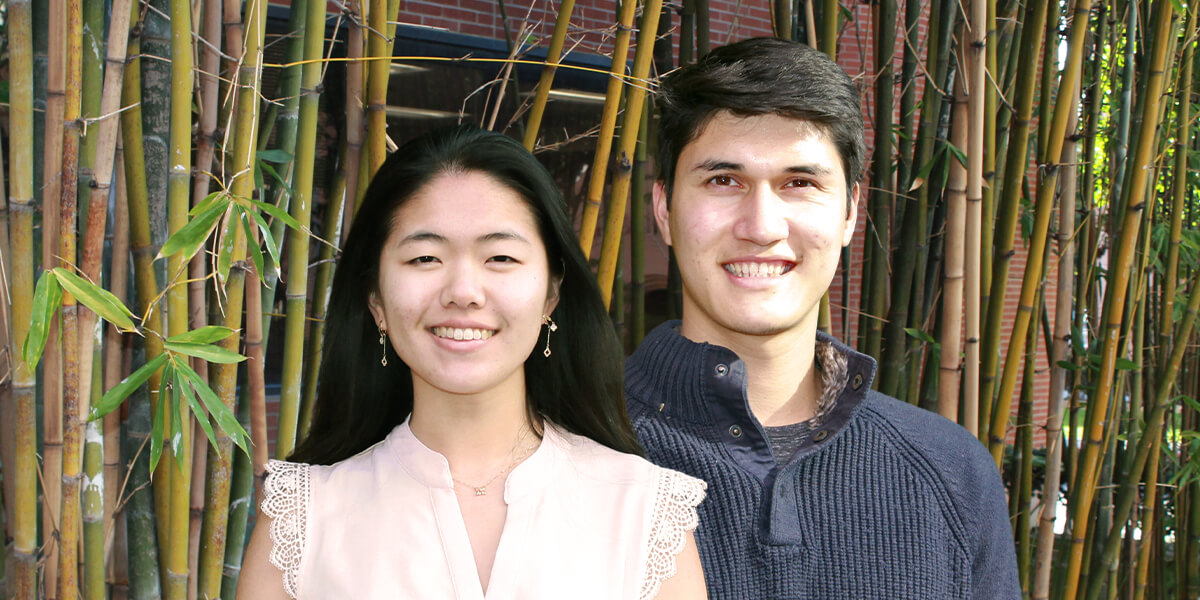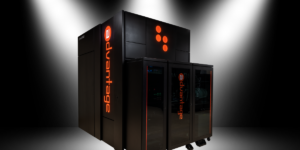
Graduating seniors Jocelyn Liu and Lorand Cheng received three years of funding from the National Science Foundation to continue research they began in the Department of Electrical and Computer Engineering.
Jocelyn Liu and Lorand Cheng, graduating seniors in the Ming Hsieh Department of Electrical and Computer Engineering, were individually selected to receive 2023 National Science Foundation (NSF) Graduate Research Fellowships. These awards grant three years of funding — $37,000 per year — to support each student’s research as they continue to graduate school.
Both Liu and Cheng are members of the first cohort of the Ming Hsieh Institute (MHI) Undergraduate Scholars program, which is an undergraduate research community formed in 2022. The scholars lead biweekly meetings focused on creating and strengthening connections between undergraduate researchers. They also hold events which encourage students to be active in their research, such as pitch competitions and learning how to prepare for a graduate degree.
Shri Narayanan, USC University Professor and Director of the Ming Hsieh Institute, notes that Liu and Cheng’s selection by NSF reflects the strength of the department’s undergraduate scholarship. “Ming Hsieh ECE undergraduates are not only excelling academically but are passionate about research, teaching and mentoring and committed to the broader academic scholarly enterprise,” said Narayanan.
Hardware for Quantum Computing
Liu’s research, titled “Engineering – Quantum Information Science,” addresses the challenge of developing hardware for quantum computing. Though quantum computation has the potential to positively transform a multitude of scientific fields because it can tackle certain types of problems — such as engineering new drugs and proteins — much better than classical computers, quantum systems are prone to a variety of errors.
Qubits are the fundamental unit of information in quantum systems. “They are incredibly sensitive to all types of noise in the environment, so a big challenge in the field right now is designing qubit systems that are well protected from these kinds of various interactions,” said Liu.
Liu works with superconducting circuits, which are hardware systems used to physically realize superconducting qubits. These qubits are made by depositing aluminum circuits onto little chips and cooling them down to nearly absolute zero. In her current research, she proposes using machine learning to develop better quantum optimal control protocols for superconducting qubits.
“Developing better control protocols is just one steppingstone to try to eliminate noise sources so that we can scale up and unlock more computational potential,” she explained.
Liu plans to continue this research as a Ph.D. student at Princeton University this fall.
Explaining AI
The research Cheng was awarded for is titled “Multi-modal Preference Learning for Explainable Reinforcement Learning” and seeks to create explanations for AI behavior in the way that is best understood by each individual user. These explanations are crucial to improving trust and transparency when it comes to increasingly powerful and prevalent models.
Cheng explains that the challenge with this is that “the notion of explainability is poorly defined,” meaning that what constitutes an explanation varies from one person to another. An explanation developed for an expert user may completely fly over the head of an average person.
Learning user preferences has been studied and used before, such as algorithms on Amazon which cater ads to customers based on their shopping activity. However, they have not yet been applied to explainable AI. These are systems that explain the process or reasoning behind the output of a machine learning system.
For example, consider a robot playing chess. Traditional machine learning algorithms would just make a move, while an explainable system will state why that move was made. “In my research, I aim to study how preference learning techniques can be used to generate explanations across multiple modalities that adapt to what is most understandable to the user,” Cheng said.
Cheng plans to continue this research as a Ph.D. student in Machine Learning at Georgia Tech in the fall.
Founding MHI Undergraduate Scholars
Cheng played a pivotal role in the creation of the MHI Undergraduate Scholars program. In his first few years as an ECE major, he felt that the research experience was very fragmented and isolating.
“Last year, I reached out to Professor Narayanan to see if I could help form some sort of undergraduate research community,” said Cheng. “From our discussions, the MHI Undergraduate Scholars program was born.”
As part of the inaugural cohort, Cheng has worked to make joining research less daunting and more accessible for undergraduates.
“Research is fundamentally a very collaborative process, and the experience has really underscored the importance of mentorship and community for me,” said Liu. “These sentiments were echoed in my NSF application, and how I approach research and teaching today. I hope the community continues to grow and build.”
Narayanan noted that in addition to their personal achievements, the MHI Undergraduate Scholars have made notable contributions to the ECE community, including helping to launch the MHI ECE Undergraduate Research Hub.
“Our inaugural cohort of MHI Undergraduate Scholars is exemplary, and we are off to a great start,” said Narayanan. “It is wonderful to be a part of their academic journey.”
Published on May 10th, 2023
Last updated on May 10th, 2023












